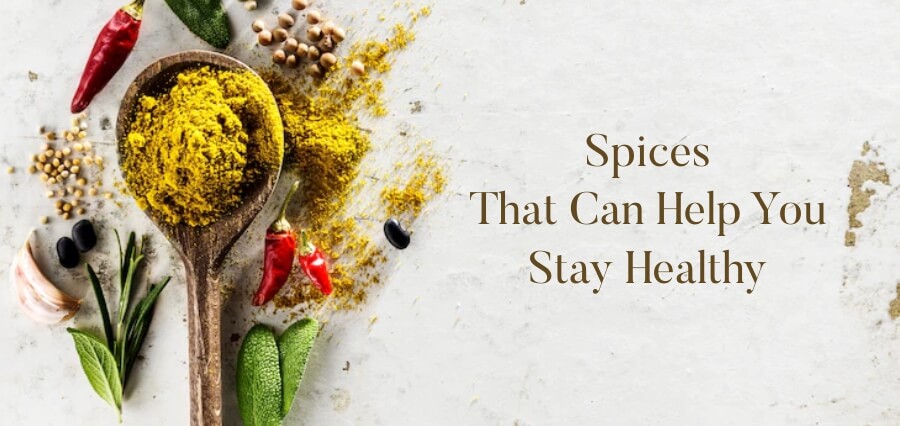Spices
Our fast-paced lifestyles lead to bad eating habits and a lack of physical activity that are unavoidable components of our daily routine. In addition to our brain and skin, a lack of exercise and a well-balanced diet significantly impacts our overall health.
Therefore, doctors and nutritionists constantly advise being active and eating more veggies, fruits, and nuts for a healthy body. For most people, herbs and spices are all about flavor, and they are only used to spice up a meal. Spices have always had two primary uses: cooking and medicine. However, in recent years, we have forgotten about the nutritional value and health benefits of spices.
Most of us have already begun to make these fundamental dietary changes in our lives, from limiting our salt intake to keep our blood pressure in check to keeping a careful eye on our oil intake to keep our cholesterol levels in check. But did you realize that we have a pantry full of heart-healthy spices? Yes, our kitchen cupboard contains a variety of Indian spices that can help maintain our hearts healthy and robust, often known as “grandmother’s prescription.”
Those prescriptions are transferred from generation to generation. There are ways of medicinal use of spices that lead to a healthy life. The best part about healthy spices is that these medicines are available in our day-to-day life.
The key healthy spices listed below provide nutritional content as well as a distinct flavor to your meal dishes, making them more delicious and healthier:
Cinnamon
Cinnamon is an excellent spice to use in sweet meals because it slows the digestion of carbohydrates (sugars), which helps to keep blood sugar levels in check. Cinnamon use on a daily basis has also been demonstrated to lower LDL (‘bad’ cholesterol) and total cholesterol levels in the blood.
Cinnamon may be added to your morning smoothie, sprinkled on oats, mixed into porridge, added to sweet baking, added to chia tea, and used in savory curries and soups to get the benefits.
Turmeric
Turmeric’s primary ingredient, curcumin, is what makes it so unique. Curcumin is an antioxidant that has been found to lower cancer, heart diseases, stomach ulcers, bacterial infections, and Alzheimer’s disease risk.
Turmeric has also been shown to be just as effective as prescription drugs in lowering inflammation. To provide your body with disease-fighting antioxidants, all you need is three to four grams of dried turmeric. It has a mild flavor, so it may be used in a variety of recipes, smoothies, baking, and even to make a turmeric latte.
Cayenne Pepper
Pull out that jar of this from the back of your cabinet from the last time you made Mexican food and start using it to spice up your meals. Cayenne pepper’s fiery flavor derives from a molecule called capsaicin, which aids in appetite suppression.
You might recall that cayenne pepper was a crucial ingredient in the terrible Lemon Detox Diet, owing to its propensity to curb hunger and make you feel replete faster. You need a small amount of cayenne pepper to receive the appetite-suppressing effects, just enough to taste the fiery flavor.
Peppermint
Peppermint is a prominent herb native to Europe and Asia that is widely used as a flavoring ingredient. Before the introduction of modern medicines, people in these areas utilized it for its cooling effects, antibacterial capabilities, and enhancing digestive health.
According to research, Peppermint, as a holistic treatment, has improved cardiovascular (heart) and pulmonary (lung) health by functioning as a bronchodilator. Bronchodilators are medications that dilate the lungs’ bronchioles (air channels). The nasal air force increases when people inhale peppermint, allowing more air to enter the lungs.
Furthermore, due to the cooling menthol element in peppermint, some studies show that it is an effective muscle relaxant, which is why menthol is widely included in muscle pain ointments and lotions.
Chilli Powder
Chilli powder promotes beneficial protein modifications in the body that aid in weight loss when consumed. On the other hand, experts aren’t entirely sure how this works.
Chili’s impact on the body’s ability to better regulate insulin, among other therapeutic effects, was found to cause weight loss in persons who drank little amounts of the spice. According to researchers, Chilli consumption reduced belly adipose tissue (fat) levels and hunger and calorie intake.
In terms of cardiovascular benefits, according to recent research from the American Heart Association, those who consume chilli powder regularly may reduce their risk of heart disease death by 26%. Additionally, frequent chilli eating has been related to a 25% reduction in all-cause mortality and a 23% reduction in cancer deaths.
Cumin
Cumin is a flavorful cooking spice with a pleasing aroma. It is also excellent for weight loss, cholesterol management, stress management, etc. It also has significant antioxidant potential, according to reliable sources.
Cumin is also an anti-diabetic, according to research. Over the course of 24 weeks, a group of 80 patients took an Ayurvedic formulation, including cumin, and their postprandial blood sugar was dramatically lowered.
Cardamom
Another spice with a long list of potential health benefits is cardamom. Cardamom is a spice made from the seeds of ginger trees that are often used in beverages like chai tea, coffee, desserts, and even savory foods.
The spice’s therapeutic qualities are mainly attributed to its volatile oils, fixed oils, phenolic acids, and sterols. The volatile oils in cardamom seeds are analgesic, anti-inflammatory, antimicrobial, and antispasmodic.
According to animal research, cardamom may also aid with obesity and high cholesterol. Cardamom supplementation reduced total cholesterol and triglyceride levels in obese rats.
Conclusion
In a nutshell, spices are diverse in nature and frequently employed as flavoring, coloring, and preserving agents in Indian cuisine and internationally. Spices have been utilized as dietary supplements in India for a long time.
Spices, when consumed as part of a balanced diet, can assist in maintaining a healthy lipid profile and keep blood glucose levels in check. Many spices, such as cardamom, can aid with gastrointestinal issues and cholesterol balance. Spices come in various forms, including fruit, bark, seeds, and many others.
Spices have traditionally been regarded as beneficial in Ayurveda. Spices are utilized in Ayurveda to cure various ailments, including gynecological issues, hepatic disorders, infectious infections, and blood abnormalities.















